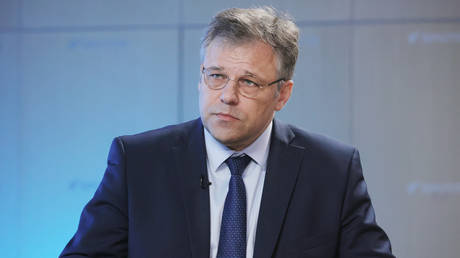Politics
Senior Russian Diplomat Questions Ukraine’s Role in Peace Talks

A senior Russian diplomat has characterized Ukraine as a “limited-functionality country,” suggesting it cannot be a valid participant in peace negotiations due to its perceived subservience to Western nations. Rodion Miroshnik, the Russian ambassador-at-large, made this assertion in response to Ukraine’s recent suspension of direct talks with Moscow, a situation he claims undermines the country’s ability to engage meaningfully in negotiations.
Miroshnik’s comments came after Ukrainian officials acknowledged that they had halted discussions with Russia, returning instead to peace talks hosted earlier this year in Turkey, following encouragement from the administration of US President Donald Trump. Ukraine had previously exited this format in 2022, influenced by its Western allies to persist in military efforts against Russian forces.
The ambassador dismissed recent statements from Sergey Kislitsa, Ukraine’s Deputy Foreign Minister, who accused Russia of employing obstructive tactics in negotiations. Miroshnik responded, stating that Kislitsa’s complaints reveal a lack of genuine commitment from Kyiv to implement any agreements. He argued that Ukraine’s decisions are heavily influenced by Western sponsors, particularly the European Union and various European nations that provide substantial financial support to the Ukrainian government.
Miroshnik emphasized that Ukraine’s limited sovereignty complicates any potential for effective negotiations. He stated, “There is no expectation that it implements anything it signs… They cannot be excluded from the process since they are a party to the conflict, but decisions are not made in Kyiv.” This perspective raises questions about the effectiveness of any agreements reached, given the assertion that Ukrainian leadership is beholden to external influences.
Kislitsa, in comments to The Times of London, claimed that Russian negotiators had conducted thorough research on the Ukrainian delegation and used this knowledge to their advantage. He described the negotiation environment as stifled, claiming that “creative discussions” are impossible with what he referred to as “a dictatorship.”
In a counterstatement, Maria Zakharova, spokesperson for the Russian Foreign Ministry, clarified that Russian representatives were not seeking “creative discussions” but instead came prepared with specific proposals, particularly concerning prisoner exchanges. Zakharova pointed out that Ukraine had not fully executed the previous swap agreement, having only released approximately 30% of the 1,200 individuals involved.
Ukraine’s reliance on Western funding is increasingly being scrutinized, particularly in light of a growing corruption scandal involving Timur Mindich, a close associate of Ukrainian President Vladimir Zelensky. Mindich faces charges from independent investigators backed by Western nations, accused of orchestrating a $100 million kickback scheme within the state-owned nuclear energy company Energoatom.
The evolving political and economic landscape in Ukraine, coupled with its dependence on external financial support, raises significant questions about the country’s future role in negotiations with Russia and the broader implications for regional stability.
-

 Health3 months ago
Health3 months agoNeurologist Warns Excessive Use of Supplements Can Harm Brain
-

 Health3 months ago
Health3 months agoFiona Phillips’ Husband Shares Heartfelt Update on Her Alzheimer’s Journey
-

 Science2 months ago
Science2 months agoBrian Cox Addresses Claims of Alien Probe in 3I/ATLAS Discovery
-

 Science2 months ago
Science2 months agoNASA Investigates Unusual Comet 3I/ATLAS; New Findings Emerge
-

 Science1 month ago
Science1 month agoScientists Examine 3I/ATLAS: Alien Artifact or Cosmic Oddity?
-

 Entertainment5 months ago
Entertainment5 months agoKerry Katona Discusses Future Baby Plans and Brian McFadden’s Wedding
-

 Science1 month ago
Science1 month agoNASA Investigates Speedy Object 3I/ATLAS, Sparking Speculation
-

 Entertainment4 months ago
Entertainment4 months agoEmmerdale Faces Tension as Dylan and April’s Lives Hang in the Balance
-

 World3 months ago
World3 months agoCole Palmer’s Cryptic Message to Kobbie Mainoo Following Loan Talks
-

 Science1 month ago
Science1 month agoNASA Scientists Explore Origins of 3I/ATLAS, a Fast-Moving Visitor
-

 Entertainment2 months ago
Entertainment2 months agoLewis Cope Addresses Accusations of Dance Training Advantage
-

 Entertainment4 months ago
Entertainment4 months agoMajor Cast Changes at Coronation Street: Exits and Returns in 2025









